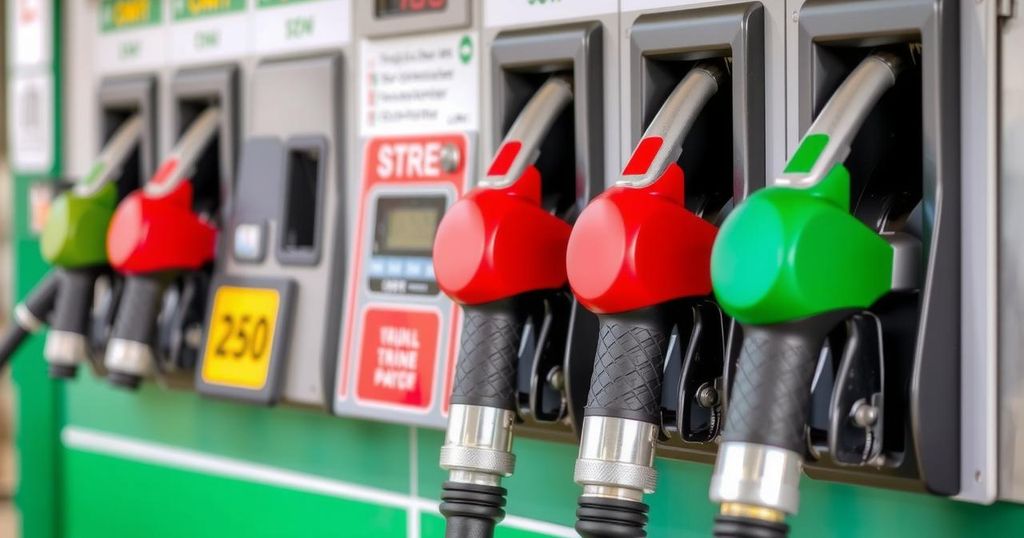EPRA Reduces Fuel Prices by Sh4.37 per Litre Ahead of Festive Season in Kenya

The EPRA has reduced fuel prices by Sh4.37 per litre for petrol, Sh3 for diesel and kerosene, marking the lowest prices since April of last year. The revisions are influenced by lower international petrol prices, although diesel and kerosene prices are rising globally. Consumers may face increased transport fares despite fuel reductions, highlighting a need for fair pricing during peak seasons.
The Energy and Petroleum Regulatory Authority (EPRA) has enacted a significant reduction in fuel prices, aiming to lessen the financial strain on Kenyan citizens as the festive season approaches. Effective immediately following the latest pricing update released on Saturday, petrol prices have been lowered by Sh4.37 per litre to Sh176.29. Concurrently, diesel and kerosene prices have each been reduced by Sh3, bringing diesel to Sh165.06 and kerosene to Sh148.39.
This reduction marks the lowest retail prices for these petroleum products since April of the previous year. The adjustment stems from a slight decrease in international petrol prices. However, it is crucial to note that the global prices for diesel and kerosene have seen an upward trend. Additionally, the exchange rate for the Kenyan Shilling against the US dollar has stabilized around Sh129, which has facilitated the maintenance of steady foreign exchange components in fuel pricing.
Although this price reduction benefits motorists, it may not have the same effect for commuters, as public service vehicle (PSV) operators are known to raise transport fares during peak travel seasons. Reports indicate an anticipated increase in transportation costs for journeys from urban areas like Nairobi to rural destinations. There have been calls for manufacturers and transporters to reflect these cost reductions in consumer prices following the recent October adjustments by EPRA.
Consumer rights advocate Stephen Mutoro has highlighted the tendency of companies to rapidly increase prices in reaction to elevated operational costs but exhibit caution in reducing prices when costs diminish. The recent decline in fuel prices, falling over Sh40 per litre since October of the previous year, can largely be attributed to decreases in crude oil prices, a strengthened Kenyan Shilling, and selective government subsidies implemented through the petroleum development levy.
The improvement in the stability of the Kenyan Shilling, now trading at Sh129 to the US dollar compared to Sh155 and Sh164 in previous months, has aided in reducing costs incurred by importers in acquiring petroleum products. Consequently, this has contributed positively to the reduction in retail prices. Nevertheless, the current price adjustments accentuate the need for fairness in pricing practices across the market.
The announcement from the Energy and Petroleum Regulatory Authority (EPRA) reflects an essential intervention aimed at easing the pressures on consumers during the festive period, often characterized by increased travel expenses. With the cost of living at the forefront of public concern, such price cuts offer necessary relief. The interplay between international oil prices, the state of the Kenyan Shilling, and local operational costs influences petroleum pricing significantly, underscoring the complexities of the market.
In summary, the EPRA’s recent fuel price reductions are a welcome relief for motorists, coinciding with the festive travel season. While petrol, diesel, and kerosene prices have decreased, the potential for increased transport fares poses challenges for commuters. The overall stability of the Kenyan Shilling further reinforces the positive impact of these adjustments. There remains, however, a call for equitable pricing practices in the market to ensure that all consumers benefit from the decline in operational costs.
Original Source: www.mwakilishi.com




